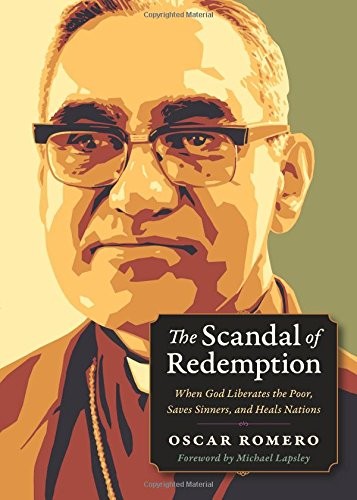4thace reviewed The Scandal of Redemption by Oscar Romero
Review of 'The Scandal of Redemption' on 'Goodreads'
4 stars
My Lenten reading this year was a collection of writings by the archbishop of San Salvador in the late 1970s who was shot to death in a political hit during a service. I do not think a reader has to become an expert in the national and international politics of this time, though it does help to understand the context of the social ills and attitudes making up the topics of the sermons and diary entries collected in this volume. In a similar way, having some knowledge of the teachings of the Catholic Church would help remove some of the mystery surrounding the theological topics he mentions. Óscar Romero had aligned himself with the opposition to the authoritarian regime which gained power during a coup in 1979 even though he had been quite conservative in his personal views, identifying with the oppressed poor and their suffering. His initial motivation was …
My Lenten reading this year was a collection of writings by the archbishop of San Salvador in the late 1970s who was shot to death in a political hit during a service. I do not think a reader has to become an expert in the national and international politics of this time, though it does help to understand the context of the social ills and attitudes making up the topics of the sermons and diary entries collected in this volume. In a similar way, having some knowledge of the teachings of the Catholic Church would help remove some of the mystery surrounding the theological topics he mentions. Óscar Romero had aligned himself with the opposition to the authoritarian regime which gained power during a coup in 1979 even though he had been quite conservative in his personal views, identifying with the oppressed poor and their suffering. His initial motivation was his personal sense of being moved by the suffering of people he knew, not out of an abstract idea of what is just. Later it was the experience of people who rallied to his preaching which kept him from keeping silent no matter what this would mean for him.
The most striking thing about these pieces is how much courage it must have taken to see the assassinations of other Salvadoran priests, of regular citizens working on behalf of the opposition to the junta, and still speak out. To hear of times when Romero would celebrate Mass while hostile elements were present with curved knives drawn was to witness a prophet. He quoted the Bible repeatedly to criticize what the military officers and their death squads did in his country and to contrast that with the theology of liberation. To him, the search for freedom from violence was inseparable from faith, and this led inevitably to a call for action. He drew from the model of Jesus Christ who also preached against injustice during a time of violence and met death at the hands of an enemy in power.
This book took me all of Lent to finish, even though it is pretty short. I found this book even more powerful than the other book I read about a christian witness, Dietrich Bonhoeffer's [b:The Cost of Discipleship|174834|The Cost of Discipleship|Dietrich Bonhoeffer|https://i.gr-assets.com/images/S/compressed.photo.goodreads.com/books/1348281510l/174834.SY75.jpg|2723088]. It isn't light reading or something for a person in search of tranquility and comfort, but a worthy book for someone searching for a spirituality that will challenge them. Archbishop Romero rejects a kind of religion which only preserves the status quo and declines to call out sin when it is carried out by the ones in power. He also has nothing good to say about a religion concerned only with the afterlife. He died for doing this, but his death took on a meaning that spoke to people far beyond his church and his country. For this martyrdom Óscar Romero was canonized in 2018.

